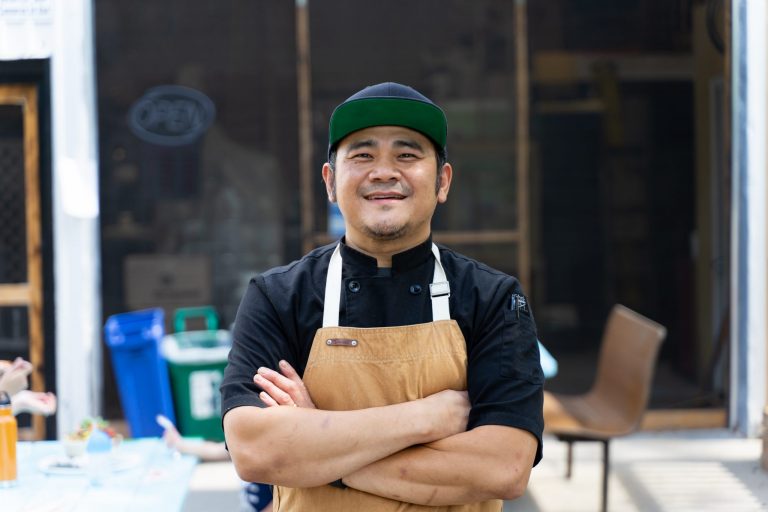Going back to a restaurant for the first time since the pandemic started is strange for so many reasons. There are the masks, the hand sanitizer, the new ways to walk around the spaces and be physically distant. One thing though that hasn’t changed is one of the most universally confusing parts of dining out — tipping.
But that confusion may soon go away at the popular Wooden Boat Food Co. in Kitchener. Owner and chef Thompson Tran plans to make a slow transition to a no-tipping policy for his restaurant over the next few months. For Tran, moving to no-tipping is more than just about the customer experience, it’s about doing what’s right for his staff.
“This is about inequity between the front and back of the house. When you tip your server or waitstaff at a restaurant, the amount is supposed to be split between the server and the team who are prepping the food, making your meal and cleaning the dishes,” Tran said.
As a longtime back of house worker, Tran knows that the split rarely happens in an equal way.
“The front of the house gets all the tips and they figure out what to give. It’s usually around five to ten per cent,” Tran said.
“So for every $100 in tips collected, the server keeps $90 to $95 dollars with the back of house getting the remainder.”
That remainder is then split between the staff in the kitchen. Tran said that this makes it difficult for the staff to know what they’re going to be taking home. “It’s all in the hands of the servers.”
To drive home the lack of equity in the current model, Tran pointed to what’s happened during the COVID-19 pandemic.
“In the world of [COVID-19], the first people that got let go were the servers,” Tran said.
“It was tough, but the back of house staff are the backbone keeping restaurants going. Success in restaurants is supposed to be 50/50 food and hospitality — but that’s never been reflected in take-home pay.”
Tran also pointed out that the current model of tipping creates additional problems within a restaurant.
“The inequity and the control of the tips lead to sexual harassment and bullying — it’s a broken power dynamic.”
Moving to a no-tipping policy has been on Tran’s mind for years, but implementing it successfully is a challenge. Tran has been speaking with fellow restaurateurs about their experiences, including Todd Perrin of Mallard Cottage in Newfoundland and Ryan Donovan of Richmond Station in Toronto.
“Mallard Cottage moved to the same model, no-tipping. I wanted to see how they’ve implemented it,” Tran added.

While no-tipping is the norm outside of North America, some issues have to be addressed with both front of house staff and customers to make it work here. Tran’s move to no-tipping means that the price you see for an item on the menu includes a built-in service fee. As part of the plan, Tran is looking at including not just the service fee, but also the tax in the price. For Tran, this removes the ambiguity of figuring out the tax and tip when looking at a menu.
“This is where education comes in. We need to advertise to consumers that it’s what you’d pay anyways — it’s now just plain and simple,” Tran said.
In the current model of restaurant pricing, the consumer dictates the staff’s pay. You may feel you’re doing right by being a consistent 15 to 20 per cent every time diner, but as Tran pointed out, the server still doesn’t have income stability. The server also still controls how much of the tips they distribute to the back of house staff.
“Let’s take that out of play. We can make our staff feel stable,” Tran said.
According to Tran, there’s no financial motivation for a restaurant owner to move to a no-tipping model.
“If a restaurant owner has something to gain, this would be the norm across the board,” Tran said.
Restaurant margins are notoriously low, to begin with, especially for independently-owned businesses such as the Wooden Boat Food Co.
“Mom and pops like me, I can basically do what I want. But also knowing that I’m not going to gain much by doing so,” Tran said.
While North America is the only place globally that expects tips for service, Tran sees the fight to eliminate tipping as part of a better experience for everyone — diners, front of house and back of house.
“Servers will fight tooth and nail to keep the old model, they have a lot to lose. But for the back of house, it’s not about getting more money, it’s about gaining equity.”

